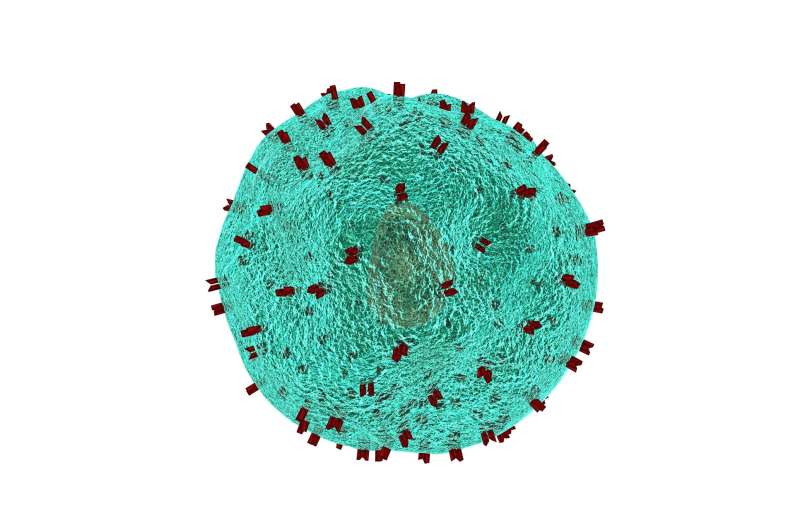Novel tool counts T cells quickly helping predict patient response to cancer therapy

Scientists at UCL and the Francis Crick Institute, London, have developed a new tool, which can rapidly estimate the number of T cells (immune cells) in a cancerous tumor; with T cell abundance helping predict a patient's response to immunotherapy, researchers are hopeful this could enable more targeted and effective cancer therapies.
As part of the Cancer Research UK-funded TRACERx project, published in Nature, scientists analyzed DNA sequencing data from patients' cancerous tumors, to see if they could quantify the fraction of T cells within a sample.
Explaining the research, corresponding author Dr. Nicholas McGranahan (UCL Cancer Institute), said: "DNA sequencing is frequently performed on cancer patient's tumors for patient stratification and to understand how a cancer has developed.
"Estimation of immune cells, which are important for controlling cancers, influencing patient survival and guiding treatment, has in the past not been possible to estimate solely from DNA sequencing data.
"We aimed to explore whether we could develop a novel method to elucidate immune cells directly from DNA sequencing, without the need for more data."
DNA sequencing allows scientists to see the evolutionary history of how individual tumors have developed. In this research they developed a tool (or method) to 'look back' and calculate levels of T cell 'VDJ recombination'; this is a process in T cells, in which they are reassembled or altered and given the tools, allowing them to identify and attack invaders.
Specifically, they found a 'signal', which indicated the loss of T cell receptor excision circles (TRECs), needed for T cell maturation, which occurred during VDJ recombination. By giving this 'loss' a score, they were able to estimate accurately the number of T cells present in the tumor.
Dr. McGranahan added: "We show that this score can be used to predict response to immunotherapy and immune evasion mechanisms.
"The score can also be applied to DNA sequencing data derived from normal blood samples that are typically collected but until now have not been able to be systematically analyzed for immune content."
Why this will help immunotherapy
In recent years checkpoint inhibitors (CPIs), a type of immunotherapy, have emerged as a revolutionary treatment for many cancer types.
CPIs work by blocking proteins called checkpoints, that are made by T cells; these checkpoints help keep immune responses from being too strong and sometimes can keep T cells from killing cancer cells. When these checkpoints are blocked, T cells can kill cancer cells better.
One of the biomarkers found which predict the likely success of immunotherapy is the quantity of T cells present. The more T cells available for CPIs to adapt, the more cancer cells can be destroyed.
First author Dr. Robert Bentham, Senior Research Fellow (UCL Cancer Institute), said: "Quantifying T cell infiltration directly from DNA sequencing provides greater predictive power of patient response to treatment without the need for additional data.
"Indeed, the process we've developed can be done without additional time or cost, beyond standard DNA sequencing.
"Our tool will also enable more research into the immune system, not only in the context of cancer."
Scientists say, as the tool has only been used in research so far, they will need to develop it further before it can be made available for clinical use.
More information: Harnessing sequencing data to quantify T cell fraction and therapy response, DOI: 10.1038/s41586-021-03894-5 , www.nature.com/articles/s41586-021-03894-5



















